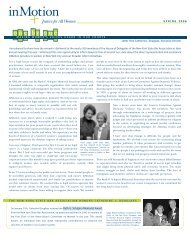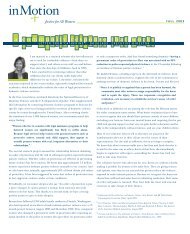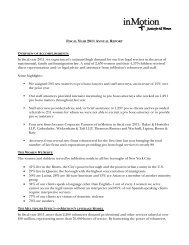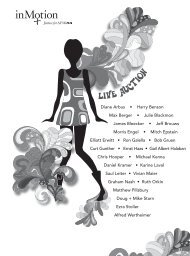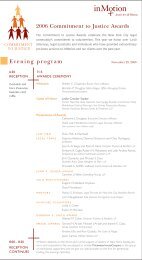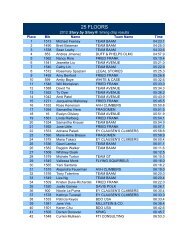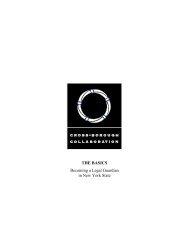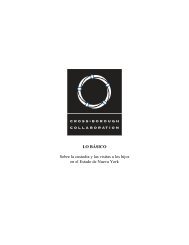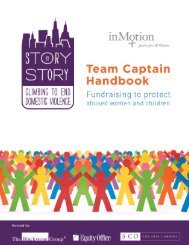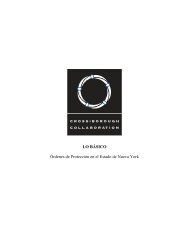Create successful ePaper yourself
Turn your PDF publications into a flip-book with our unique Google optimized e-Paper software.
volunteer profile<br />
PROTECTING BATTERED IMMIGRANT WOMEN<br />
Luis Rodriguez, Jr., Esq.<br />
Growing up in a Latin American and Caribbean immigrant community in Crown Heights, Luis Rodriguez saw first hand the mistreatment and struggles<br />
of undocumented immigrant families. Shortly after establishing his business law practice in Manhattan, Luis began to look for meaningful ways<br />
to positively impact immigrants living in New York City. Drawn to <strong>inMotion</strong>’s diverse and supportive pro bono program, Luis enrolled in a Continuing<br />
Legal Education (CLE) training seminar to learn how to help battered immigrant women self-petition for legal residency under the Violence Against<br />
Women Act (VAWA).<br />
My practice serves the derivative<br />
transactional needs of banks and<br />
slowly gained her trust and began to gather the facts of her case and build a<br />
timeline of events.<br />
brokerage firms, as well as the<br />
The biggest challenge in preparing Marcella’s VAWA self-petition was<br />
transactional needs of small businesses.<br />
gathering the evidence required to prove abuse. The only witnesses to<br />
Like many attorneys who work<br />
her pain and suffering were her husband’s family and they were unlikely to<br />
primarily for corporate clients, I began<br />
doing pro bono work because I wanted<br />
to feel connected to an individual—to<br />
make a difference in someone’s life<br />
and my community. For attorneys like<br />
myself that want to do public service<br />
but whose busy schedules prohibit them from taking on pro bono cases that<br />
require a great deal of time in court, <strong>inMotion</strong>’s immigration program is an<br />
attractive volunteer alternative. And for those without experience in<br />
immigration law, <strong>inMotion</strong>’s training programs and supportive staff, who are<br />
always available to answer questions and review documents, make it easier<br />
for attorneys to take on these types of cases.<br />
support her allegations. With very limited documentation available, I<br />
petitioned the New York Police Department (NYPD) for a copy of a 911 call<br />
she made early in her marriage which I hoped would provide dramatic and<br />
powerful evidence of abuse. I was disappointed to find that the NYPD erases<br />
these tapes after a short period; only a microfiche with the bare facts of the<br />
call remained on record. InMotion recommended that Marcella see a<br />
domestic violence counselor who could then provide a supporting letter to<br />
the U.S. Citizenship and Immigration Services (USCIS) to attest to her<br />
emotional state as a victim of domestic violence and sexual assault, and as<br />
evidence of mistreatment and abuse by her husband.<br />
I filed Marcella’s VAWA self-petition, status<br />
Over the past two years, I have helped two<br />
adjustment and employment authorization<br />
battered women self-petition for legal<br />
“Once, I was afraid and ashamed to tell<br />
applications in March of 2004. Within a month,<br />
residency. My second <strong>inMotion</strong> client, anyone what was happening in my marriage.<br />
we received a prima facie letter from the USCIS<br />
Marcella*, was only 17 years old when she And though I am still afraid of men touching stating that they believed her case was credible.<br />
left her family in Guatemala to find work in<br />
America. Two years after arriving in the U.S.,<br />
me sexually, I have learned that there are<br />
times that you must reach out to others and<br />
While the prima facie does not guarantee that the<br />
application will receive final approval, it was a<br />
she met and fell in love with her future<br />
to speak out against domestic violence.” very positive sign and it enabled Marcella to apply<br />
husband. Shortly after the wedding, her<br />
Marcella for important public benefits for herself and her<br />
husband began to drink heavily and became<br />
son pending the agency’s final decision.<br />
increasingly possessive of Marcella. He refused<br />
to let Marcella see her friends, learn to drive or to take English lessons—<br />
reasoning that she only wanted to learn to speak English to flirt with other men.<br />
The USCIS approved Marcella’s employment authorization in October<br />
2004. With no support from her husband, she had been forced to work very<br />
hard for very little in the City’s underground economy. Receiving her work<br />
After the birth of their son, Marcella’s husband promised to stop drinking,<br />
authorization was especially important to her. It made her feel, in a very<br />
but like many times before, his promise was short-lived. He regularly stayed<br />
tangible way, that she was making progress in her life. Then, just nine<br />
out drinking all night. When he returned home drunk, he often demanded<br />
days later, we received notification that Marcella’s VAWA self-petition was<br />
sex—and if Marcella refused, he would hit her and force her to have sex. On<br />
approved. Marcella was overjoyed! Marcella had her status adjustment<br />
one occasion, he beat her face so severely he broke her nose. He then<br />
interview just a few months ago. She was extremely nervous about the<br />
stopped giving Marcella money for household expenses and she became<br />
interview. Marcella was shocked when the USCIS agent asked her only three<br />
entirely dependent on his parents for rent, food, diapers and milk.<br />
mundane questions and then stamped her passport. On June 6th, Marcella<br />
Eventually, he moved out of their apartment, only returning when he was<br />
became a legal permanent resident of the United States.<br />
drunk and wanted sex. His sexual assaults became more violent; he once<br />
raped her in front of their then four-year-old son. Like so many battered<br />
Latin women, Marcella was too ashamed to tell her family or friends about<br />
the abuse and humiliation she was suffering in her marriage.<br />
Since becoming a legal resident, Marcella is more confident and selfassured.<br />
She has told me of her ambitions to further her education and<br />
employment skills. She recently returned to Guatemala with her son to visit<br />
her family for first time since coming to America 10 years ago. I am very<br />
I was assigned Marcella’s case in July 2003. At our first meeting, Marcella was<br />
happy for her and to have had this opportunity to help her build a safer and<br />
not comfortable speaking about the domestic violence in her life with a<br />
more secure life for herself and her son.<br />
male—especially a Latin male. I interviewed Marcella several times and<br />
*Client name has been changed to protect her identity.<br />
6




